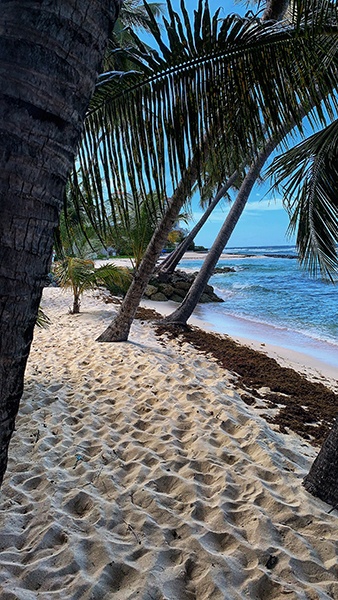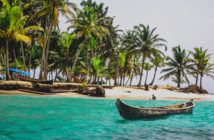Thinking about moving to the Caribbean from the UK?
For many Brits, living life on a Caribbean island is the ultimate dream, and thousands of UK expats have chosen to do just that.
But what is it really like living in paradise? And with so many breathtaking islands to chose from, where should you go?
Read our guide to the best Caribbean islands for British expats to discover more about what each exotic location has to offer…
Contents
Barbados
Barbados is probably one of the first places that springs to mind when you think of a Caribbean island.
It’s famous for its sensational golden sand beaches lapped by warm, turquoise ocean waters, and is understandably a favourite destination for sun worshippers. In fact this quintessential eastern Caribbean island may just be the ultimate location for fun, adventure, and relaxation, with almost year round sunshine.
The glittering coast offers up the chance to plunge deep below the sea to discover crumbling shipwrecks or swim with turtles, experience wild surf or sail your way around the island.
Inland, a landscape dotted with lush forests and sugarcane plantations awaits, and the island’s vibrant towns and cities are abuzz with lively bars, gourmet restaurants, and cracking rum fuelled nightlife.
Formerly a British colony, Barbados is a predominantly English speaking island with a charming and friendly population and laid back lifestyle, as well as retaining many similarities with dear old Blighty.
The economic climate is very stable, and standards of healthcare and education are high. Tourism and hospitality are the biggest employment sectors for expats, although other sectors such as childcare, finance, accounting, construction, and legal offer up additional opportunities.
But how much does a slice of paradise cost? The truth is that Barbados can be an expensive place to live.
Property and rental prices can be expensive — especially in exclusive coastal areas, and as goods are largely imported, things such as groceries, electrical goods, and dining out at restaurants can be pricey, and taxes are high.
Curaçao
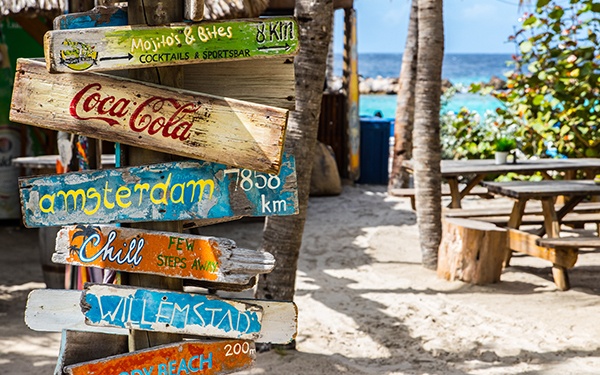
Colonised by Dutch West India Company merchants in the mid 17th century under whose authority it became a major port for trade in both goods and West African slaves, Curaçao is now popular for much better reasons.
Many former Dutch colonial buildings still remain, although these days they are painted to please in pretty pastel colours and house classy hotels and chic boutiques.
Curaçao is a thriving island brimming with culture, with excellent museums, an exciting arts scene, and innovative restaurants.
The island’s capital — Willemstad — is not only in part a UNESCO World Heritage Site, but also a working city with a booming economy and plenty to entertain including galleries, cafés, shops, and vibrant nightlife.
Curaçao’s official language is Dutch, although English is widely spoken, and the locals also speak Papiamento — an interesting mix which is peppered with Spanish, Portuguese, English, French, Dutch and West African.
Living costs on the island are reasonable, and around 30% cheaper on average compared to London. Expat retirees benefiting from the pensioner’s scheme have the advantage of no capital gains tax, and income taxed at just 10 percent.
Curaçao is also one of the Caribbean’s premier diving hotspots, and the island features amazing coral reefs, walls, and sunken ships, all protected from strong currents in waters that stay warm all year round. Windsurfing, sailing, and water skiing are also popular, and the island is blessed with 38 beautiful sun drenched beaches dotted with hidden coves.
Grand Cayman
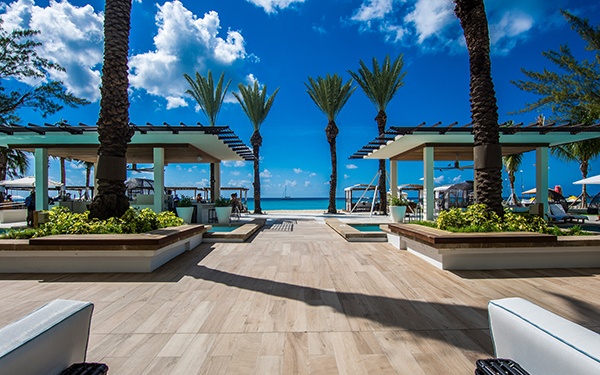
Glamorous and cosmopolitan Grand Cayman has a population made up more of foreigners than native Caymanians, and is home to many UK expats, with English being the main language spoken.
The island’s glittering white sand Seven Mile Beach is widely regarded as one of the most beautiful beaches in the world, and Grand Cayman and its smaller sister islands offer up a treasure trove of tropical jungles inhabited by exotic wildlife, idyllic coves and palm fringed bays, and turquoise seas teeming with turtles, stingrays, and colourful fish.
As well as having natural riches in abundance, Grand Cayman is also a draw for the well heeled and wealthy who come here to see and be seen, lounge in luxurious beach resorts, dine in fine seafood restaurants, and shop till they drop.
The month of May brings the highlight of the entertainment calendar — the fabulous Cayman Carnival Batabano — which attracts thousands of people each year who come to join the rum fuelled fun.
The island is a tax haven, and its thriving economy is largely driven by its status as a global financial hub, with the capital George Town being the commercial centre of the state, with banks, businesses, hotels, and government buildings. This plus the tourism and hospitality industries open up plenty of employment options for British expats thinking of relocating here and benefiting from the high quality of life.
Living on the island however, can be expensive.
Because of Grand Cayman’s tax free salaries policy, tax is charged on everyday items, which bumps up the cost of living significantly.
The upside to this is that salaries are usually fairly generous in order to compensate for the higher cost of living.
St Thomas
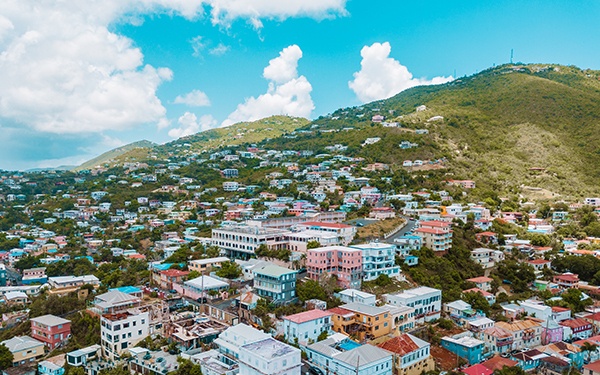
The most developed of the 4 islands that make up the US Virgin Islands, St Thomas is an intriguing blend of Caribbean and American cultures, where the landscape takes the form of verdant jungle covered mountains, mysterious mangrove lagoons, and sparkling beaches sipped by the azure, emerald ocean.
The bustling port of Charlotte Amalie is the main town, with attractive red roofed buildings dotted amongst the hills and one of the world’s most beautiful harbours – also one of the world’s most active cruise ship ports.
The island’s flourishing tourist industry has given rise to big resorts and exclusive shopping malls, and offers world class diving, kayaking, snorkelling with turtles, and serene sandy bays for soaking up the rays. St Thomas attracts the mega rich with their luxury yachts, and also a large number of expats.
The nightlife on the island is pretty good too, with theatres, cinemas, concerts, and lively clubs and bars. Foodies love St Thomas’ sensational culinary scene, where fresh seafood plays a significant role on the menus of top rated restaurants.
As you would expect from such a luxurious, beautiful, and tourist focused destination where a large quantity of goods are imported, living costs on the island — including rent, groceries, and entertainment — are fairly expensive.
Dominica
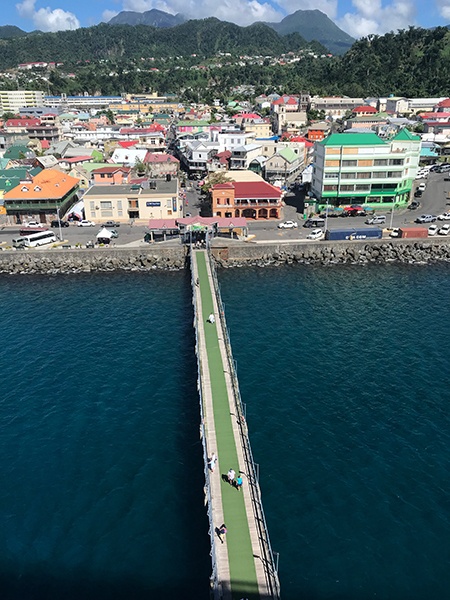
Few islands on earth are more captivating, beautiful, and majestic than Dominica.
The island’s lush mountainous interior is swathed in tropical rainforest and alive with exotic flora and fauna. Gushing waterfalls tumble great heights into the swirling waters below, and volcanoes give birth to boiling lakes and sulphurous hot springs.
Thankfully Dominica remains relatively unspoilt, and there is an emphasis on environmentally friendly tourism rather than heavy construction and big resorts.
Winters are warm and pleasant, never dropping below 21°C, and summer temperatures hover at around a balmy 30°C, although late summer can bring a risk of hurricanes and flash floods.
Once colonised by both France and Great Britain, Dominica is a happy mix of French, English, African, and Caribbean tribal cultures, and music and dance have huge importance in daily life — even more so at carnival time when the island comes alive in a riot of colour and sound.
Rental prices on Dominica are surprisingly low compared to many other Caribbean islands, which is a big plus for the expats who live there, and the general cost of living — although not cheap — is still lower than that in the UK, particularly if you stick to buying local produce.
One thing is certain — if you love nature and the outdoors, you will love Dominica and the abundance of activities from hiking through jungles, national parks, UNESCO Heritage Sites, or along the coast, to just lazing on the beach or diving, snorkelling or other watersports.
St Kitts
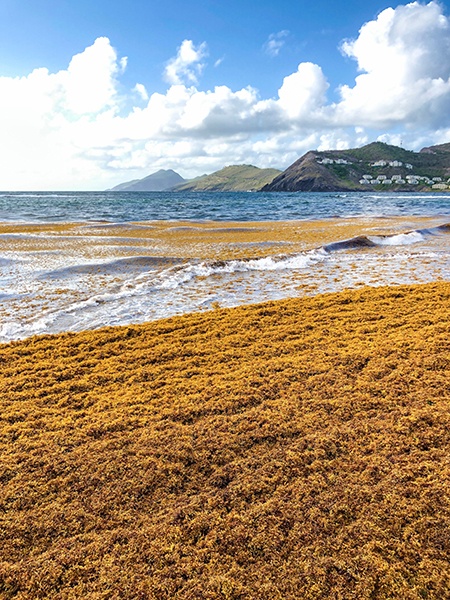
Alongside the smaller neighbouring island of Nevis, St Kitts is a popular destination for wealthy expats and retirees who are attracted by the island’s undeniable charms, from the friendly locals and the chilled out lifestyle, to the rolling green mountains, elegant botanical gardens, and gorgeous beaches perfect for watching the sun sink below the horizon with a cocktail in hand.
St Kitts is well developed as a tourist destination, and the main towns of Basseterre with its large, luxury resorts and huge Port Zante which welcomes a steady stream of cruise ships, plus the decadent Frigate Bay resort, offer up a wealth of excellent restaurants, electric nightlife, laid back beach bars, and great shopping.
The island also has an interesting history largely built on the sugar and tobacco industries, and it’s possible to explore the 18 mile long scenic sugar trail by train.
The Brimstone Hill Fortress is an intriguing UNESO World Heritage site in a wonderful national park which was built by the British in 1690 using slave labour, which offers insight into life at the fort, slavery, punishment and other related subjects.
For expats who like a bit of excitement there are a ton of outdoor activities on the island too, including dune buggy adventures, jet skiing, diving, sailing, hiking, and more.
Life on the island can be relatively affordable, as utilities, alcohol and groceries are cheaper or on a par with the UK, and earnings are tax free.
Things such as imported goods and vehicles, entertainments, and real estate are expensive, and unless you are looking to start up your own business, finding employment as an expat in St Kitts can be tricky.
Grand Bahama
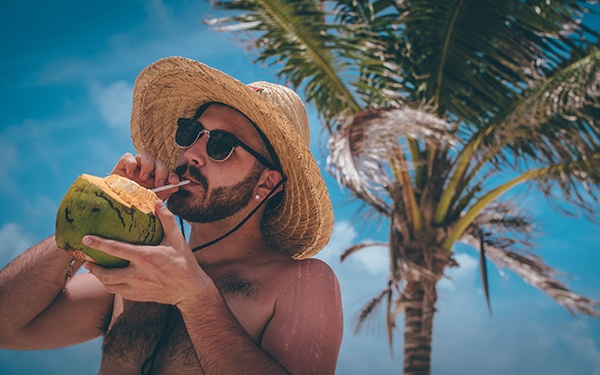
Grand Bahama’s two main towns of Freeport and Lucaya are the main hubs of activity on this 80 or so mile long island, complete with boutique hotels, luxury resorts, great restaurants, duty free shopping, casinos, clubs, and bars, and cater largely to the tourist crowd, many of whom arrive daily in droves on cruise ships.
Away from town however, the rest of the island is a whole other animal altogether.
Much of Grand Bahama is wild and unspoilt, with an attractive coastline dotted with characterful fishing villages and pretty, powdery beaches, as well as mangrove swamps and a huge national park covered with dense forest, ideal for trekking and discovering the island’s picturesque landscape.
As you would imagine, this natural wonderland makes Grand Bahama an excellent location for diving, kayaking, fishing, and plenty of other activities both on land and in the sea, including world class golf courses.
Due to the ease of access to the US mainland — it’s just 55 miles from the Floridian coast — prices on the island can be high, particularly rental and property prices.
However with almost year round sun guaranteed, plus a host of entertainments both in and out of town, Grand Bahama is a popular choice for expats who can afford it.
Antigua
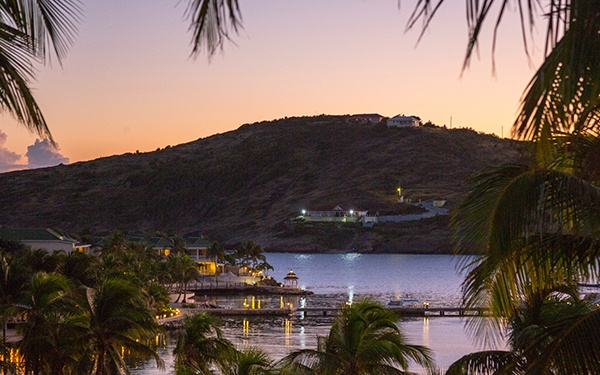
Horatio Nelson was famously stationed on Antigua when the island was colonised by the British who constructed a naval station here, and many vestiges of Antigua’s colonial past still remain to this day, as well as a clear English cultural influence.
The buzzing capital St John’s is a compact and friendly city peppered with brightly coloured Georgian buildings, and boasting a fantastic market, a glittering yacht filled harbour, boutiques, gourmet restaurants, and lively bars.
The real jewels in Antigua’s crown though are its countless blissful palm fringed beaches and hidden coves surrounded by emerald, lapis waters.
To make the most of the sublime coastline, take a sunset cruise, snorkel amongst the stunning coral reefs, or for a boozier experience undertake the famous beach bar crawl.
Despite the British influences of the past and the main spoken language being English, Antigua is still very much a Caribbean island with a relaxed Caribbean culture and warm and welcoming locals, and in the evenings it bursts into life with bars playing live music and serving generous quantities of rum.
It’s a destination hugely popular with tourists, but for those who live here daily life can be expensive, with prices generally higher than in the UK, particularly food and housing.
Roatan
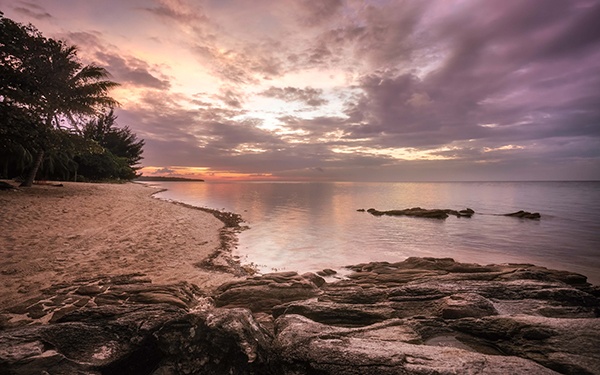
The largest and most popular of the Bay Islands 50 miles off the coast of Honduras, Roatan is scattered with jungle and pine forests at its heart, rimmed with incredible white sand beaches, and encircled with one of the world’s largest barrier reefs swollen with marine life, and is absolute heaven for divers and snorkellers who come here from all over the globe.
Roatan culture is a mixture of African, Spanish, and Caribbean, and the island is also home to a large expat community.
It’s considerably more affordable than some of its neighbouring islands, and the general cost of living is less expensive than living in big cities in the UK, although electricity is expensive, as are imported goods.
Rental and property prices however are very affordable, which is good news for Brits who are considering making Roatan their home.
The island boasts almost perfect weather, amazing wildlife, stunning natural scenery, a fantastic lifestyle, and a wealth of activities and entertainments.
Aruba
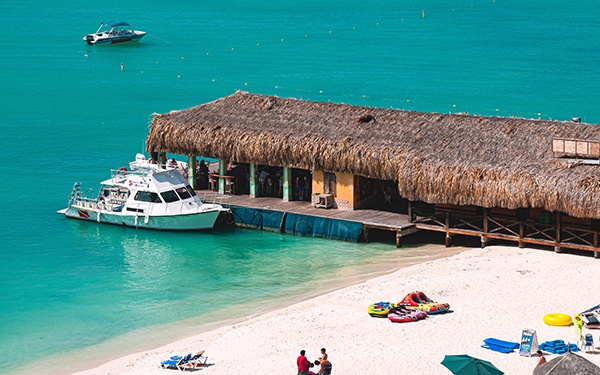
In the southern Caribbean Sea just off the coast of Venezuela lies the island of Aruba with its unique landscape of arid desert, glittering, far reaching beaches, rugged, windswept coastline, and sunken shipwrecks which provide shelter for all kinds of marine life.
Such a diverse natural landscape throws open the doors to equally diverse activities from 4×4 desert tours and horseback riding, to scuba diving, snorkelling, kitesurfing and windsurfing — or just lounging on the beach.
Aruba caters to those who want to relax and have fun.
This has always been a prosperous island owing to the gold, oil, and tourist booms it has seen over the centuries.
The bustling capital Oranjestad well known for its big, luxury resorts, wide variety of delicious dining venues, and scintillating nightlife, from casinos and party boats to salsa dancing.
Everywhere you turn people are smiling and happy, which is no wonder when this island paradise has so much to offer. Aruba is considered a constituent country of the Kingdom of the Netherlands, and the Dutch touch can be clearly seen.
It has a very stable economy, but prices on the island are relatively high, and the popularity of the island among tourist bumps up costs in considerably.
St Barths
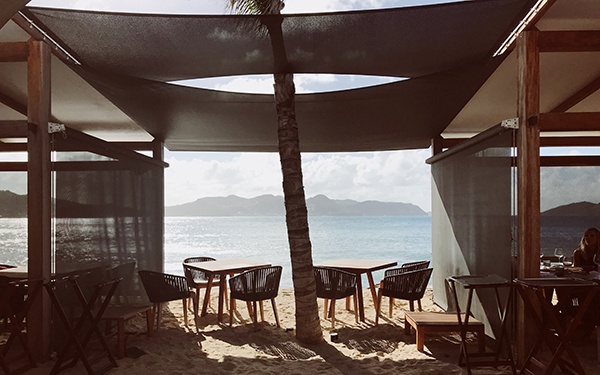
Whether you choose to call it St Barths, St Barts, or St Barthélemy, this Caribbean island is an exquisite treasure where the rich, beautiful, and famous come to lap up the refined blend of French elegance, luxurious living, and tropical wonders.
If you come to stay or live on St Barths, be sure that you have generous funds, as this is a high class destination which commands very high prices.
You won’t find any big resorts on this exclusive island — rather independent luxury hotels and villas, chic boutiques, and world class restaurants.
Although small, St Barths has a large number of perfect sun drenched white sand beaches just made for working on your tan, looking good, and people watching.
If the regular St Barths pastimes of dining on gourmet fare, sipping champagne and cocktails, flashing your cash on designer goods, and relaxing on the beach should get tiresome, take a break with some watersports such as kitesurfing or sailing, dive in the warm, turquoise ocean, or get to know the modest and charming locals and enjoy the luxurious and laid back atmosphere.
St Lucia
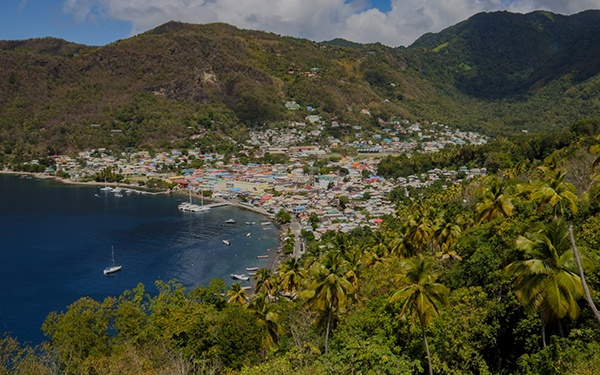
Undeniably one of the most magical Caribbean islands, St Lucia may only be just shy of 30 miles long, but it is blessed with incredible natural beauty.
The island’s most iconic landmark is the Pitons — twin volcanic mountain spires enrobed with lush forest which burst majestically out of the blue sea.
To the north, stretches of gorgeous golden beaches decorate the coastline, whereas to the south the sans turn to glittering silver.
Luxuriant rainforest fills the island’s interior, offering up unique jungle hikes and the opportunity to zipline through the canopy.
Discover the world’s only drive-in volcano with steaming sulphur springs and natural mud baths.
The island is dotted with romantic boutique hotels and charming authentic villages, and the towns of Rodney Bay and Castries boast lively nightlife and fantastic Creole cuisine.
The culture of this English speaking island is a mix of West African, East Indian, British, and French, and colonial architecture and plantations are still very much in evidence. St Lucia has a relaxed, easy going atmosphere, and warm and welcoming locals who love to have fun and make the most out of life.
The island is well known its celebration of music — particularly folk and country — and it also hosts a world famous jazz and arts festival each year.
Agriculture, tourism, plus banking and finance fuel St Lucia’s economy, and life on this exclusive little island is generally quite expensive, with electricity, imported goods, taxes, and rental prices being particularly costly.
Nassau
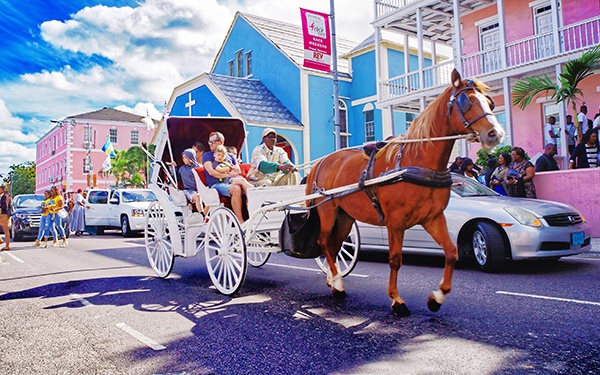
Once a hangout for pirates and smugglers, Nassau is the booming capital of the Bahamas, and is situated on New Providence island.
To some extent its buccaneering spirit still remains, and it’s the place to come to dodge taxes, get cheap duty free deals, or have a wild night out.
But Nassau is not just gritty, it’s also glamorous. There is a wealth of grand Georgian colonial architecture, historic forts, and elegant streets lined with trees, all of which can be explored by taking a tour with a horse and carriage.
Lavish casinos, decadent restaurants, trendy cafés, contemporary galleries, and high class boutiques offer a wide range of upper crust entertainments.
As you would expect from the capital city of such a culturally diverse collection of islands, Nassau is home to a large expat community, and there are quality international schools and a high standard of healthcare.
Being the financial and commercial hub of the Bahamas, there are a number of sectors where Brits may find employment, or choose to set up their own businesses.
But although it is highly developed, Nassau is nevertheless still a natural paradise where you can bliss out on the beach, swim with turtles or dolphins, or snorkel, kayak, sail or dive.
Which do you think is the best Caribbean island for British expats?

